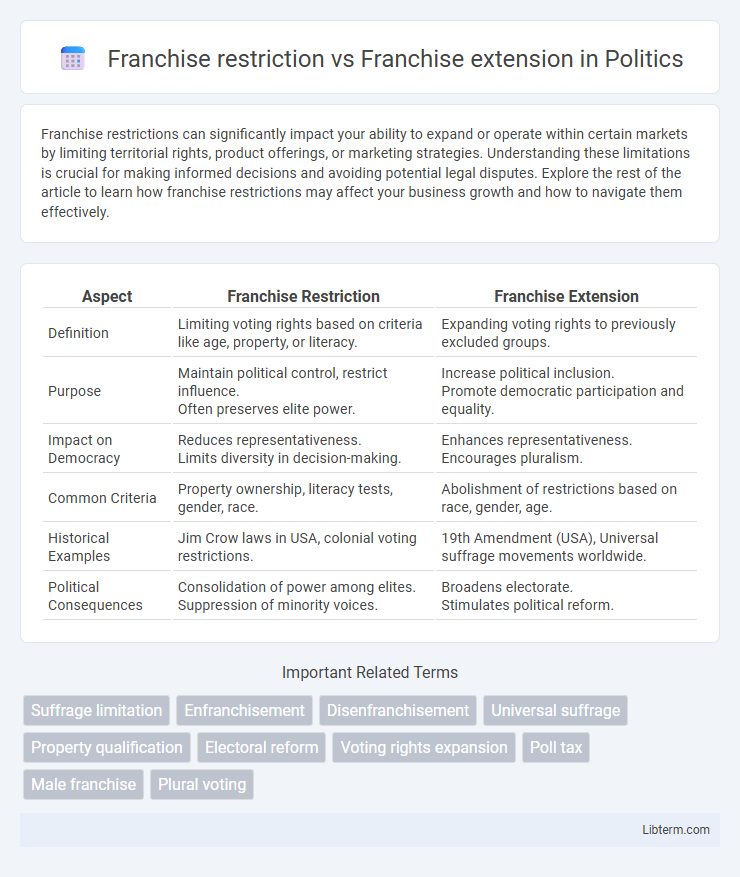Franchise restrictions can significantly impact your ability to expand or operate within certain markets by limiting territorial rights, product offerings, or marketing strategies. Understanding these limitations is crucial for making informed decisions and avoiding potential legal disputes. Explore the rest of the article to learn how franchise restrictions may affect your business growth and how to navigate them effectively.
Table of Comparison
| Aspect | Franchise Restriction | Franchise Extension |
|---|---|---|
| Definition | Limiting voting rights based on criteria like age, property, or literacy. | Expanding voting rights to previously excluded groups. |
| Purpose | Maintain political control, restrict influence. Often preserves elite power. |
Increase political inclusion. Promote democratic participation and equality. |
| Impact on Democracy | Reduces representativeness. Limits diversity in decision-making. |
Enhances representativeness. Encourages pluralism. |
| Common Criteria | Property ownership, literacy tests, gender, race. | Abolishment of restrictions based on race, gender, age. |
| Historical Examples | Jim Crow laws in USA, colonial voting restrictions. | 19th Amendment (USA), Universal suffrage movements worldwide. |
| Political Consequences | Consolidation of power among elites. Suppression of minority voices. |
Broadens electorate. Stimulates political reform. |
Understanding Franchise Restriction and Franchise Extension
Franchise restriction limits a franchisee's operational scope, often through territorial boundaries, product offerings, or specific business practices outlined in the franchise agreement to protect the franchisor's brand and market position. Franchise extension involves expanding the franchise territory, contract duration, or product lines, enabling franchisees to increase their market presence and revenue potential while maintaining compliance with franchisor guidelines. Both concepts require clear contractual terms to balance control and growth opportunities within the franchising relationship.
Historical Evolution of Voting Rights
Franchise restriction historically involved limiting voting rights based on race, gender, property ownership, or literacy, reflecting societal hierarchies and exclusionary practices. In contrast, franchise extension marks the gradual expansion of suffrage through legislative reforms, such as the 15th and 19th Amendments in the United States, abolishing racial and gender barriers to voting. These evolutions underscore a trajectory toward inclusivity and democratic participation across various nations.
Key Arguments for Franchise Restriction
Franchise restriction centers on preserving brand consistency and protecting intellectual property by limiting unauthorized use of trademarks and trade secrets. It ensures quality control across franchises, preventing dilution of the brand reputation caused by substandard products or services. Legal frameworks supporting franchise restrictions safeguard both franchisors' investments and consumer trust by enforcing compliance with established operational standards.
Major Advocates of Franchise Extension
Major advocates of franchise extension include civil rights leaders, labor unions, and progressive politicians who champion voting rights to promote inclusive democracy. Organizations like the NAACP and the ACLU have been pivotal in pushing for expanded suffrage to marginalized communities, emphasizing equity and social justice. These advocates argue that broadening franchise access strengthens representation and addresses systemic disenfranchisement.
Socioeconomic Impacts of Voting Policies
Franchise restriction policies, which limit voter eligibility based on criteria such as age, citizenship, or criminal status, can significantly reduce political participation among marginalized groups, exacerbating socioeconomic inequalities. Conversely, franchise extension policies that broaden voting rights, including lowering voting age or restoring voting rights to disenfranchised populations, promote greater political inclusion and can lead to policies that address income inequality and social justice. Empirical studies show that expanded enfranchisement often correlates with increased government responsiveness to public welfare programs and improved social outcomes.
Legal Frameworks Governing Franchise Eligibility
Franchise restriction laws limit eligibility based on criteria such as age, residency, or citizenship, ensuring controlled voter participation within specific legal frameworks. Franchise extension policies aim to broaden voter eligibility by amending constitutions or statutes to include marginalized groups, reflecting evolving democratic principles. These legal frameworks balance societal inclusion with regulatory measures to maintain election integrity.
Case Studies: Global Examples of Franchise Changes
Franchise restriction and extension significantly impact brand growth and market penetration, as seen in global case studies like McDonald's strategic franchise restriction in India to maintain quality control, contrasting with Domino's aggressive franchise extension in China to rapidly capture market share. In the UK, Costa Coffee's franchise extension facilitated widespread accessibility, while franchise restrictions in Australia helped protect local partners and preserve brand standards. Analyzing these variations highlights the importance of tailoring franchise strategies to regional consumer behavior and regulatory environments for optimal business performance.
Political Consequences of Expanding or Limiting the Vote
Expanding or limiting the franchise significantly shapes political power dynamics by altering voter demographics and influencing election outcomes. Franchise extension often promotes inclusivity and democratic legitimacy by incorporating marginalized groups, leading to policy shifts that reflect broader public interests. Conversely, franchise restrictions can entrench existing elites, suppress dissent, and provoke social unrest, impacting stability and governance quality.
Contemporary Debates on Voter Inclusion
Franchise restriction involves limiting the right to vote based on criteria such as age, citizenship, or criminal history, often sparking debates on democratic representation and fairness. Franchise extension advocates for broadening voter eligibility to include marginalized groups like youth, non-citizens, or formerly disenfranchised populations, emphasizing inclusivity and political equality. Contemporary discussions focus on balancing electoral integrity with expanding democratic participation to strengthen pluralistic governance.
Future Prospects: Balancing Restriction and Extension
Franchise restriction limits market reach by confining operations to specific territories, impacting short-term growth but preserving brand control and exclusivity. Franchise extension broadens market presence, enabling scalability and increased revenue potential while introducing challenges in maintaining consistent quality and brand standards. Future prospects require strategic balance, leveraging data analytics and market trends to optimize growth without compromising brand integrity or franchisee satisfaction.
Franchise restriction Infographic

 libterm.com
libterm.com